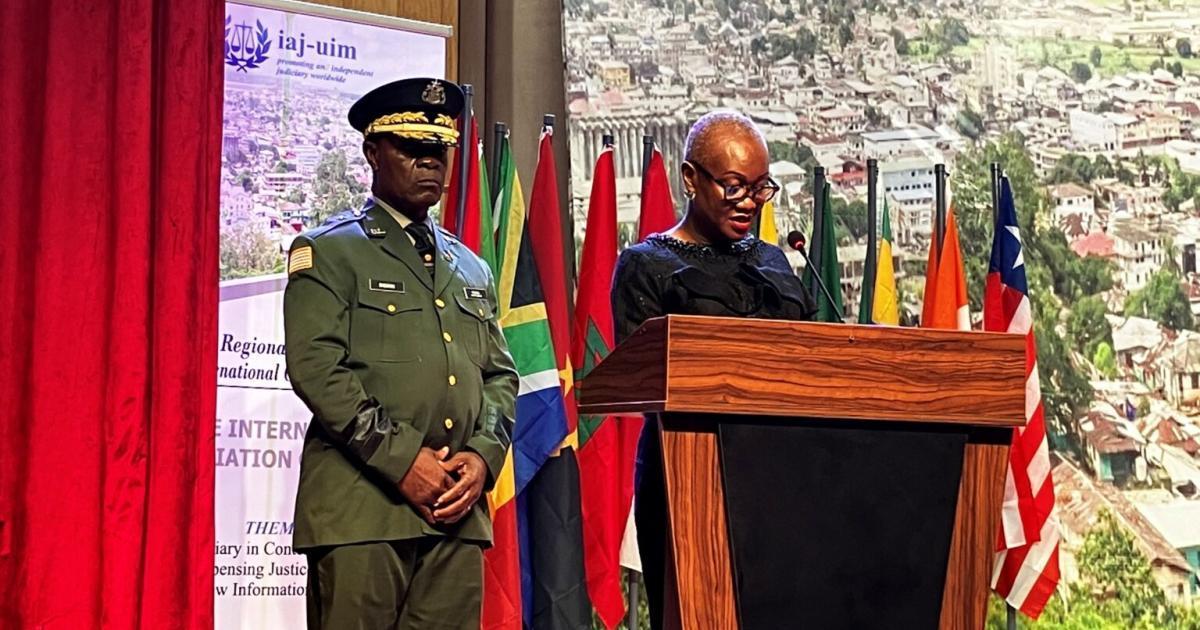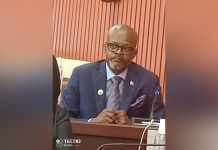Africa-Press – Liberia. While many believe that judicial actors’ inability to dispense justice fairly and the reported sale of justice to the highest bidder is the major reason why many Liberians, and foreigners alike, do not believe in the country’s justice system, Chief Justice Sie-A-Nyene Yuoh thinks that could be another reason.
The low level of confidence in the justice system, Chief Justice Youh said, is due to the uncontrolled nature of social media—raising concerns about the impact of social media on public confidence in the justice system in Liberia.
Speaking at the International Association of Judges (IAJ) conference on Monday, May 6, the nation’s most senior judicial figure emphasized the dangers of misinformation and sensationalism spread through social media platforms.
Justice Yuoh noted her assertion is supported by the fact that the issues surrounding free speech, and checks and balances are overwhelmingly abused by online reporters who conveniently substitute accurate reporting for misinformation and sensational headlines.
Speaking on the topic; “The Impact of the Media on the Public’s Perception of Justice in the New Information Age”, Justice Yuoh said, it is the fact that not all of those reporting and posting have any formal or informal training in mass communication and do not have the slightest thought or conviction as to the damaging effect their actions have on that innumerable population segment.
Justice Youh highlighted instances where media coverage influenced public perception of legal cases, citing examples where premature judgments were made based on incomplete or inaccurate information.
She discussed notable cases, such as the trial of Lucas Richard and the prosecution involving money laundering and drug trafficking, where media coverage led to public scrutiny and criticism of judicial decisions.
“Notwithstanding,” Yuoh noted, “we observe that mass media institutions continue to discuss matters that are before the courts, rendering opinions as to the guilt or innocence of party litigants and painting a picture of their ruling as a judge.”
This act, the Chief Justice emphasized, continues even after the conclusion of the trial, when the decision of the court is finally rendered.
She said, the private prosecutrix (Jessica Lloyd) is a young Liberian female, and statistics show that the population of Liberia presently stands at approximately 5.5 million, with over half compromising those of youthful age.
In plain sight, Yuoh reminded her audience that it is the fact that the youths are fanatics of the internet and social media, and, like any modern society globally, Liberian youths are hooked on this platform.
She added that the general public and the media ran amok with the case involving the youthful Liberian female rendered a judgment of guilty against defendant Lucas Richards, an adult white American national before the matter was adjudicated by the trial court.
“It, therefore, took no stretch of the imagination on the reaction of the general public to include this large youthful population, the mass media, and this time around, some legislators, when the trial judge having reviewed the evidence, held that the state did not prove the charges as alleged in the indictment, found the defendant not guilty and dismissed the charges against him,” Justice Yuoh further said.
She however observed that after the decision, media institutions and practitioners, bloggers, influencers, and other Internet users began to make denigrating statements against the judge and the Judiciary Branch of the Government, wondering “without so much as reading the trial judge’s final ruling in the case.”
Another familiar example of how media influence public perception of justice, according to her, is the criminal case involving four defendants charged by the Government with money laundering, drug trafficking, and criminal conspiracy at the Criminal Court ‘C.’
Justice Yuoh said the empanelled jury found the defendants not guilty on all charges, meaning that the state lost its case.
She noted,” Reeling from this blow, the then Minister of Justice, in a press conference proceeded to criticize and ridicule the entire Judicial Branch of Government and stated in part that it was worrisome and shameful for the courts to be setting hard-core criminal free in the face of overwhelming evidence and that the judiciary was compromised,”
According to the Chief Justice, the statement made by the Minister of Justice was widely circulated by various media organizations, with thousands of Liberians describing the Judiciary as inherently corrupt.
The criticism led to the High Court adjudging both the Minister of Justice and the Minister of Information, Cultural Affairs, and Tourism in criminal contempt.
Justice Yuoh underscored the importance of responsible journalism in portraying accurate and truthful narratives, urging media outlets and social media users to prioritize factual reporting over sensationalism.
“I believe the enormous influence that the media wields, especially in most democratic societies, must be used to propagate or disseminate factual information from authentic sources. This singular act by media institutions could shape the public perception of justice in this new information age,” she said.
By addressing the challenges posed by social media’s unchecked dissemination of information, Justice Yuoh highlighted the need for transparency and accuracy in shaping public opinion on legal matters. She emphasized the critical role media institutions play in upholding the integrity of the justice system and promoting a fair and balanced portrayal of legal proceedings in Liberia.
For More News And Analysis About Liberia Follow Africa-Press






